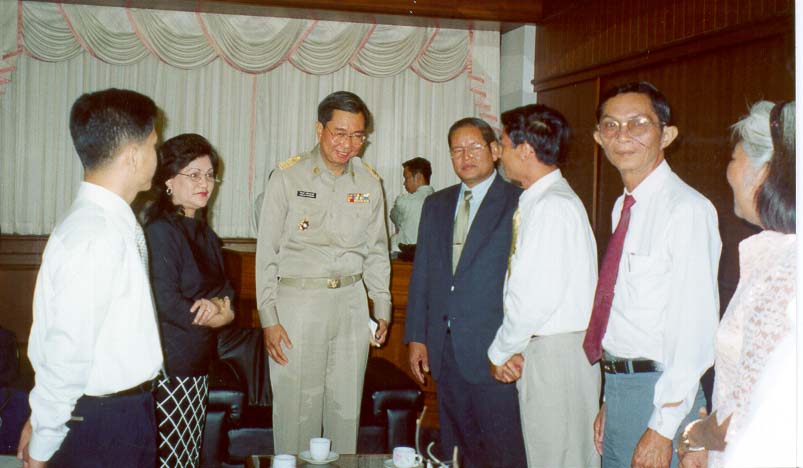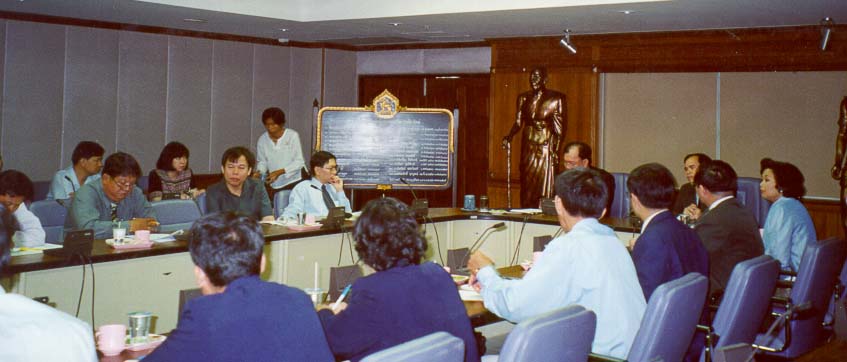The
distribution of scholarship recipients by country are: Cambodia, 8: Indonesia,
5; Lao PDR, 16; Malaysia, 6; Myanmar, 2; Philippines, 6; Thailand, 9; and
Vietnam, 19. Of these, males were
43 and females, 28.
The breakdown of
funding sources are:

| Name
of Sponsor/Funding Agency |
No.
of Students |
| DAAD |
17 |
| GOT-SEDF-Tied
Funds |
13 |
| GTZ |
10 |
| DTEC
(Department of Technical & Economic Cooperation), Thailand |
7 |
| EC
Regional Malaria Control Programme |
6 |
| Vietnam-EC
Malaria Control Project |
4 |
| HSDP/2-EC
(Health System Development Programme) |
4 |
| New
Zealand |
3 |
| Lao-German
Family Health Project |
2 |
| NITRD
(National Institute of Tuberculosis & Respiratory Diseases) Vietnam |
2 |
| Can
Tho University School of Medicine |
1 |
| SEAMEO
TROPMED Other Income |
1 |
| Vietnam-The
Netherlands Project |
1 |
|
Total |
71 |
Regular
training courses are part of the curricular offerings of host institutions with
which TROPMED Regional Centres are affiliated. Although not reflected here
enrollment in these courses include self-paying students or those supported by
other funding agencies, and those coming from Europe, Africa, U.S.A. and other
Asian countries.
2.
Implementation of Special Projects
Special projects
are those which fall under SEAMEO’s various programmes of cooperation with
international organizations and donor governments usually of short-term or
mid-term duration, are mission-oriented and with a task-specific agenda.
2.1. Regional
Workshop on Management and Programme Evaluation, June 18-22, 2001 –
organized under CHASPPAR (Control of HIV/AIDS/STD Partnership Project in Asia
Region) in cooperation with the German Agency for Technical Cooperation (GTZ);
this is one of a series of training workshops designed to strengthen
capability in HIV/AIDS control in member countries under Phase I, II and III of
CHASPPAR. Participants were from Cambodia, Germany, Lao PDR, Nepal, Philippines,
Thailand, and Vietnam.
2.2. Regional
Advanced Training Course on Data Analysis, September 10-28, 2001 –
designed to upgrade knowledge of key
health personnel on epidemiological and statistical methods under the EC Regional Malaria Control Programme in Cambodia,
Lao PDR and Vietnam.
 |
Country |
No.
of Participants |
| Cambodia |
10 |
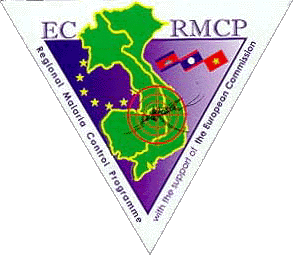 |
Lao
PDR |
12 |
| Vietnam |
10 |
| TOTAL |
32 |
2.3. Training
on IEC Development for AIDS Education Team, Ministry of Education, Lao PDR, 29
October – 2 November 2001; CHASPPAR-GTZ project to facilitate
learning materials development through computer-aided IEC production, other
related skills; and observations on best practice in Thailand.
2.4. GTZ-CHASPPAR
Regional Workshop on Ethics and Research Investigation on HIV/AIDS, November
12-16, 2001; to share information on basic ethical principles and
practices on HIV/AIDS research/investigations in partner countries and to
identify areas of concern and new initiatives.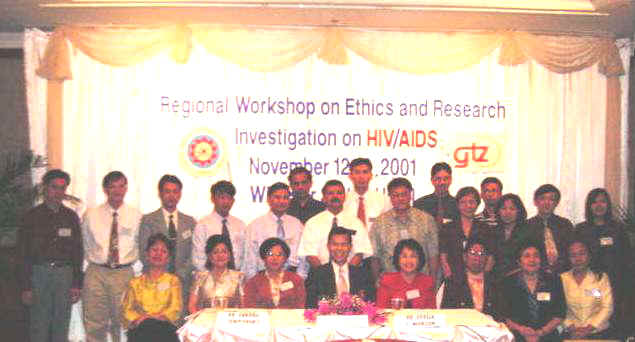
2.5.
GTZ-CHASPPAR Consultative Meeting on Publication of
Cross-Cultural Studies on HIV/AIDS, November 19-20, 2001; to discuss
the preparation of manuscripts for publication of completed studies under this
project.
2.6. SEAMEO-TROPMED
Network-Rockefeller Foundation, Regional Health Equity Project, Training on
Research Capacity Development of Health Volunteers in Myanmar, January 25-27,
2002; to train health volunteers on simple methods of health needs
assessment and community-based action research through participatory learning
approach; the overall objective of the project is to enable people at the grass
root level to be in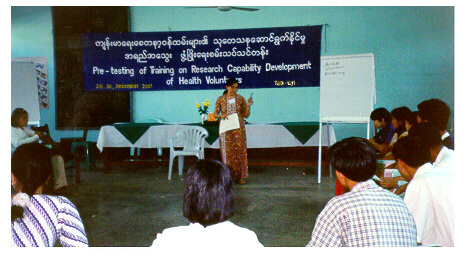 volved in the process of
identifying their health needs and problems, and to acquire the necessary
basic knowledge and skills in coping with them. Other member countries
under this project are: Cambodia, Lao PDR and Vietnam.
volved in the process of
identifying their health needs and problems, and to acquire the necessary
basic knowledge and skills in coping with them. Other member countries
under this project are: Cambodia, Lao PDR and Vietnam.
2.7. GTZ-CHASPPAR-UNESCO
Workshop on Development of Guidelines for Utilization of the Comprehensive
Package for Preventive Education on HIV/AIDS,
March
25-29, 2002; to pilot-test various learning materials prepared from
previous CHASPPAR-UNESCO workshops
and to establish guidelines for their use in respective countries; participants were from Cambodia,
India, Indonesia, Lao PDR, 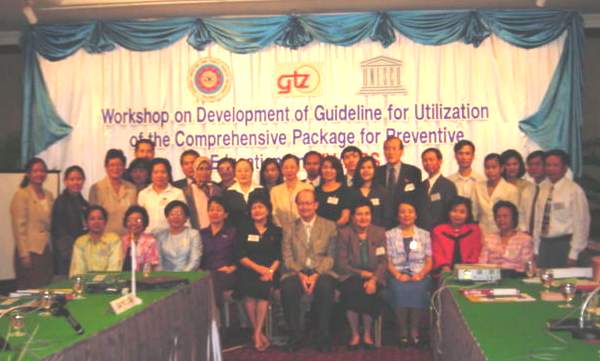 Malaysia, Mongolia, Myanmar, Pakistan, Philippines, Thailand, and Vietnam.
Malaysia, Mongolia, Myanmar, Pakistan, Philippines, Thailand, and Vietnam.
2.8. GTZ-CHASPPAR
Consultative Meeting for Internal Evaluation, April 1-2, 2002; to
assess progress made on country and regional HIV/AIDS projects and to identify
future areas for possible inclusion in planning Phase IV of the project.
2.9. Regional
Field-based Training Programme in Epidemiology and Control of Tropical Diseases,
May 13-July 31, 2002; practical training on malaria; under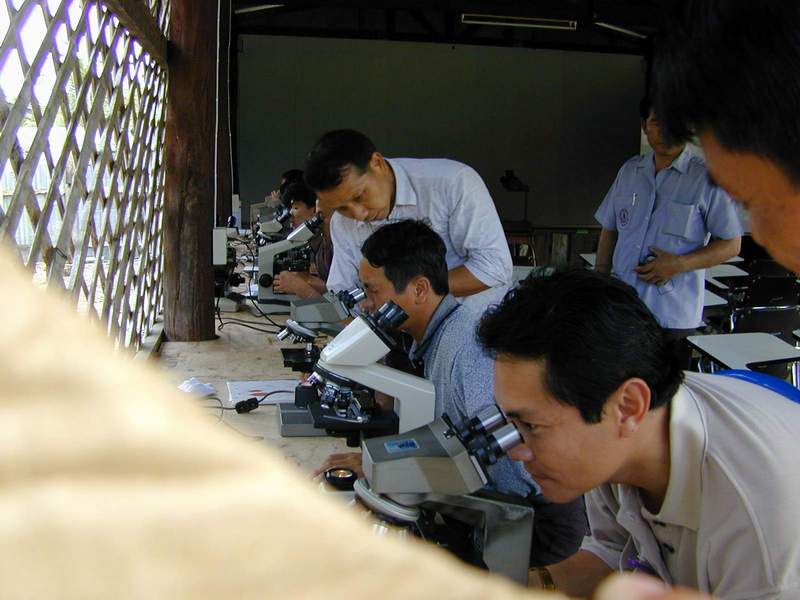 SEAMEO-France Cooperation Programme
in collaboration with
EC Regional Malaria
SEAMEO-France Cooperation Programme
in collaboration with
EC Regional Malaria 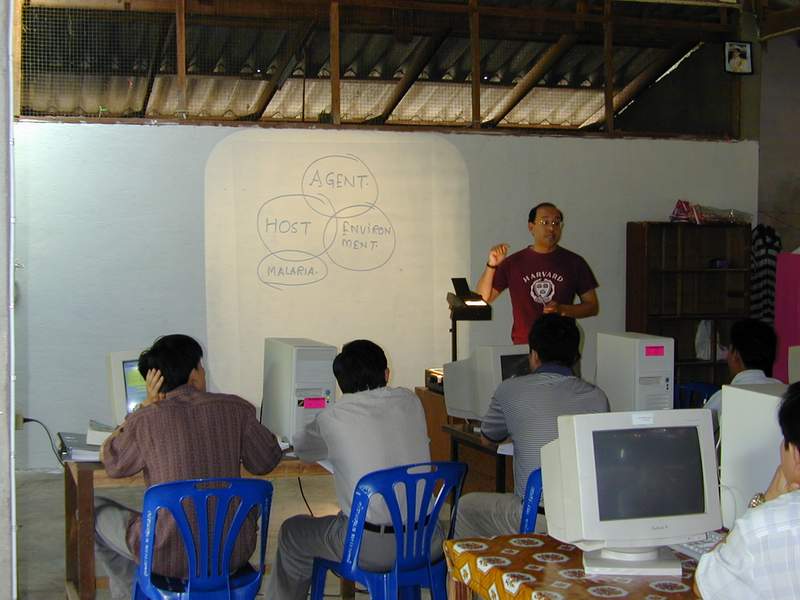 Control
Programme and WHO; participants
were from Cambodia, India, Lao PDR, Myanmar, Thailand, and Vietnam.
Control
Programme and WHO; participants
were from Cambodia, India, Lao PDR, Myanmar, Thailand, and Vietnam.
3.
Maximizing opportunities for international/regional linkages
3.1. Participated
in the 1st SEAMEO Education Congress, March 26-29, 2001, Bangkok,
Thailand; poster exhibits and panel discussions.
3.2. Joint
International Tropical Medicine Meeting (JITMM), August 8-10, 2001, Bangkok,
Thailand; organized by the Faculty of Tropical Medicine, Mahidol University in
collaboration with the Department
of Communicable Disease Control, Ministry of Public Health, Thailand;
Parasitology and Tropical Medicine Association of Thailand; TROPMED Alumni
Association; and SEAMEO TROPMED Network.
3.3. Presented a
poster exhibit entitled “Bridging
the Gap: Research Capability Development for Community Health Workers in Greater
Mekong Subregion Countries” at Global Forum 5 for Health Research, October
9-12, 2001, Geneva, Switzerland.
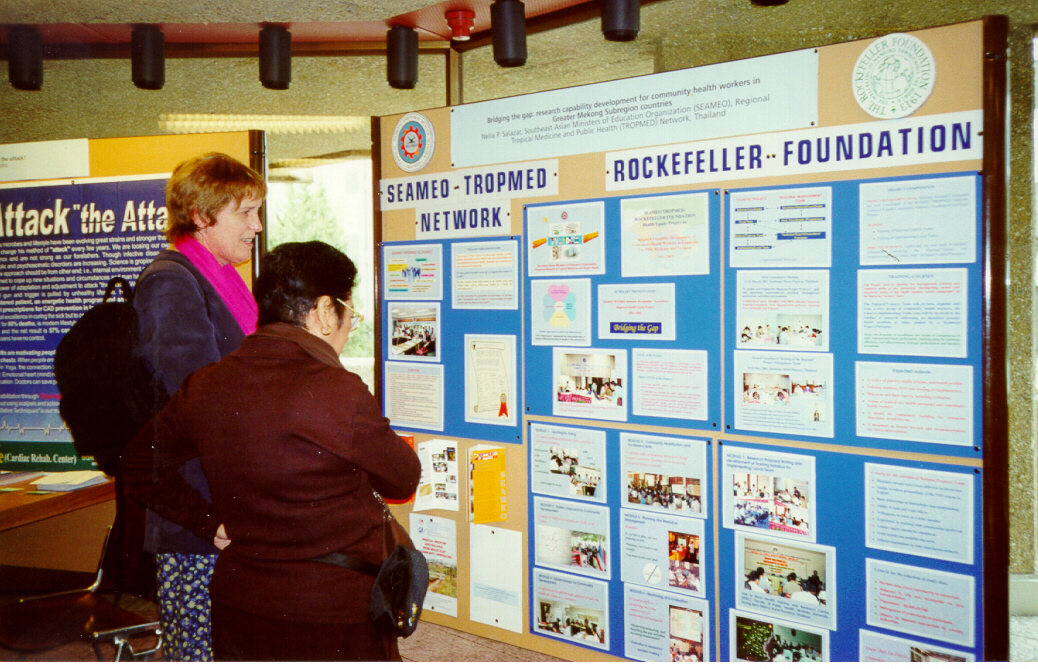
3.4. Sixth Regional
Conference of GTZ-Supported Health Projects in Asia, December 3-6, 2001, Phnom
Penh, Cambodia; exchanged information on health sector reform
process; HRD; quality management; reproductive health, and HIV/AIDS.
3.5. Participated
in the 5th International Conference on Home and Community Care for
Persons Living with HIV/AIDS, December 17-20, 2001, Chiang Mai, Thailand; 26
participants were supported by GTZ-CHASPPAR project.
3.6. Presented
papers on malaria and HIV/AIDS at the Scientific Conference on Partnership in
Public Health Development, March 18-19, 2002, coinciding with the official
inauguration of the National Institute of Public Health, Vientiane, Lao PDR.
4.
Enhancing the visibility of SEAMEO TROPMED Network
4.1. Published the
Southeast Asian Journal of Tropical Medicine and Public Health (SEAJTMPH) vol.
32, nos. 1-4, 2001; vol. 33, nos. 1-2, 2002; world-wide circulation of technical
papers based on original biomedical/clinical/epidemiological investigations on
diseases of medical and public health importance, including nutrition.
4.2. Proceedings of
the 3rd Seminar on Food-borne Parasitic Zoonoses: Food- and
Water-borne Parasitic Zoonoses in the 21st Century, Waikagul J et.
al, (Eds), SEAJTMPH vol. 32, suppl. 2,
2001, 244 pp.
4.3. Consensus on
the Use of Artemisinin Derivative Containing Combinations (ADCC) for the
Treatment of Falciparum Malaria, Warhurst D and Supavej S (Eds), SEAJTMPH vol
32, suppl. 1, 2001, 16 pp.
4.4. Published 2
monographs to commemorate the 75th Anniversary Celebration of the
College of Public Health, University of the Philippines Manila, concurrently the
SEAMEO TROPMED Regional Centre for Public Health:




 Malaysia, Mongolia, Myanmar, Pakistan, Philippines, Thailand, and Vietnam.
Malaysia, Mongolia, Myanmar, Pakistan, Philippines, Thailand, and Vietnam.